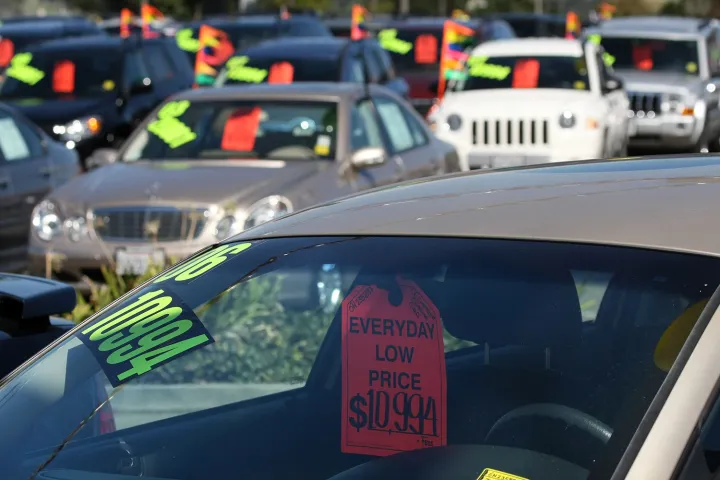
Breaking down vehicle marketing language
CDK Global provides digital marketing solutions to automakers all over the world. When you hit a dealer’s website and you see an entire new and used inventory, complete with details and pricing, chances are good that’s all being managed by CDK. When you identify yourself in an online interaction, they company creates a profile of what you’ve looked at and what you like, so that when you go to the dealership they already know what you’re looking for. This is good for consumers as well as dealers – it helps the dealer connect you with the car you want.

CDK has also gathered a tremendous amount of data about what works and what doesn’t work in auto dealer websites, and came up with some critical insights into the exact words that resonate with different groups of buyers. Auto dealers who use the right words in their online descriptions of cars have been able to attract more buyers, while those who use the wrong words lose sales.
Four big demographic groups
When it comes to buying new cars, there are four broad demographic groups that stand out: women, Generation X, new college graduates, and people with children. Obviously, any given buyer may fall into more than one of these groups or none of them, but people in these groups buy a lot of new cars.
Women tend to be more interested in the experience of a particular car than in the specifications.
“There is no one-size-fits-all solution,” Jason Kessler, lead data scientist at CDK Global, said. “The needs of those graduating college are going to be much different than those of new parents. We were able to pinpoint specific words that shed valuable light on what vehicle traits matter most to women, Generation-X consumers, recent college graduates, and parents.”
The CDK study showed that women tend to respond positively to the words Drive, Power, Trip, Comfortable, and Luxury. Women tended to be turned off by the words Bought, Transmission, Owned, Bigger, and Cargo. The marketing analysis is that women tend to be more interested in the experience of a particular car than in the specifications.
Buyers in Generation X (people born between the early 1960s and early 1980s) preferred vehicles described using Truck, Power, Luxury, Package, and Performance. They felt less inspired by the terms Back, Seat, Design, Built, and Difference. Now that Generation X is in its peak earning and buying years, performance and luxury are becoming more important than utilitarian concerns.
New college graduates, generally Millennials, responded positively to the words Buy, Work, Truck, Power, and Highway, but were less interested in Company, Designed, Inside, Warranty, and Light. These are buyers looking at their first new cars, and they want to know that the car will work for them, rather than caring more about brand names or luxury.

Parents were impressed with the words Truck, Leased, Row, Nice, and Purchase. They did not care for the terms Sounds, Buying, Control, Tech, or Company. Their preferences reflected the practical needs of a family car, rather than the lifestyle or luxury needs of other buyers.
Some of these preferences are easily understandable. A parent buying a family car is likely to be more concerned with purchase options than with the infotainment system. Other responses are more abstract, such as the Gen-X and Millennial aversion to the term Design. Dissecting the preferences of any group is far less important than simply knowing that the preference exists, however.
Magic words by type of vehicle
CDK didn’t stop with looking at groups of buyers. The company put some effort into looking at the words that appeal to any person buying a particular type of vehicle. It found that buyers of sedans, mid-size sedans, trucks, and SUVs all have different word preferences.
They found that buyers of sedans, mid-size sedans, trucks, and SUVs all have different word preferences.
Mid-size sedan buyers are interested in comfort, and they did not want to hear about Bluetooth, Simply (anything), Poor, or Test Drove. They wanted to see Luxury, Impressed, Freeway, and Quiet. Buyers of other sedans (most often compact sedans) were turned off by Tire, Warranty, Gas, and Test Drove. The compact sedan buyer responds to Passing, Climate, Friends, and Comfort, reflecting a younger buyer who will likely move up to a mid-size later in life.
Pickup truck buyers are a very distinct group interested in functionality. They wanted to see the terms Ride, Mileage, Trailer, and Reliable in a review. They cared less about Tires, Dealer, Seats, and somewhat puzzlingly, Engine. SUV buyers are family buyers, and predictably wanted to read about Front (as in front seats), Price, Wife, and Rows (of seats). They did not want to see Issues, Mileage, Steering, or Turbo.
But what does it all mean?
Don’t take this information to mean that everyone in a particular group wants the same thing, or that you’re being unfairly manipulated by clever marketers. This research is nothing more than an unusually comprehensive study of what it is exactly that most car buyers care about, and an attempt to communicate those values back to them.
“We are always looking for the best ways to help our customers bring the right buyers into their dealership,” Kessler said. “By making subtle changes to the language used on vehicle description pages, dealers can help customers easily identify cars that they both connect with and fit their lifestyle needs. Ultimately, these changes will prime both dealers and customers for success.”
So the next time you go car shopping online, give a thought to how that car is being described, as well as to the car itself. You’ll probably see some of this work in action.


